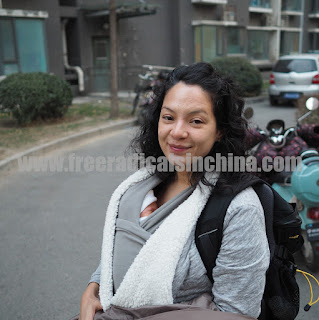Young hearts can go their way
Can't put it off another day
I don't care what others say
They say we don't listen anyway
Time has come today
-Chambers Brothers
Today is March 17. Exactly 100 days ago, Dumpling was born.
Why is this important? Because strangers can no longer scold me for taking Dumpling outside.
Warming weather and blue skies are nice going out weather, so sometimes I'll pack Dumpling up in the Boba wrap and get outside. We'll walk to the post office, buy fruit and vegetables, or just plain enjoy the fresh air. On the weekends, the three of us eat early dinners at family friendly restaurants. Going out requires travel, either by walking on the street, riding the bus/subway, or taking a taxi. Of course, a Western family carrying around a little white baby in such a strange confining wrap at best attracts curious stares and spontaneous picture taking, and at worst, vocal condemnation.
Elderly people in particular will get really close, moving aside any scarves or jacket collar obstructing their view of Dumpling nestled against my chest. Eyes narrowing, they'll ask the question everyone asks, "How many days old is that baby?" Then I'll smile and say two months, or more recently three months. Then they calculate the exact number of days. The response is usually, "That baby is too small! That carrier thing is bad for the baby's back and legs! The baby should be carried flat on its back!" Then they turn to nearby Chinese people with mild looks of exasperation and shock. Poor western mother that doesn't know how to take care of a baby.
 |
| Not yet 100 days but ready to go! |
Then I say the baby is used to it. She likes it! That's how she was she was in my stomach. It's a feeble defense against staunch thinking. Then I remind myself that the hard and fast rules-like the 100 day rule- other criticisms, and unsolicited advice show how much Chinese people value mothers and children. They aren't condemning me. They are caring for me. Right?
Younger people (meaning my age and younger) are less condemning. While they might point out that babies in China are typically confined to the home for their first 100 days of life, they are much more accepting that Westerners have different habits. They are also fascinated by the Boba wrap. Not only is Dumpling small and white, she folds up like a baby kangaroo in its mama's pouch.
But China is changing fast, and many of the traditions are falling by the wayside. One mother admitted to me that once she finished her Sit One Month, she took her infant out for a walk.
Why 100 days? I don't know, but 100 is a beautiful number. A one followed by two zeroes. The lowest three-digit number. The square of ten, and the square root of 10,000. And the number of days a baby must live before seeing the blue sky (or smoggy sky if you live in Beijing).
Chinese Phrase of the Blog: 百天 bǎi tīan
English translation: 100 days
Example sentence:
小孩满了一百天之后就好养好带了。
Xiǎohái mǎnle yībǎi tiān zhīhòu jiù hǎo yǎng hǎo dàile。
English translation: Once a child has reached 100 days old, everything is good.
Note: This is my very loose translation. Not word for word.
 |
| 17 days old went outside after leaving hospital |
 |
| 37 days old and made it to Great Leap |
 |
| 63 days and loving the blue sky |
 |
| Exactly 100 days and taking a sweet ride! |













